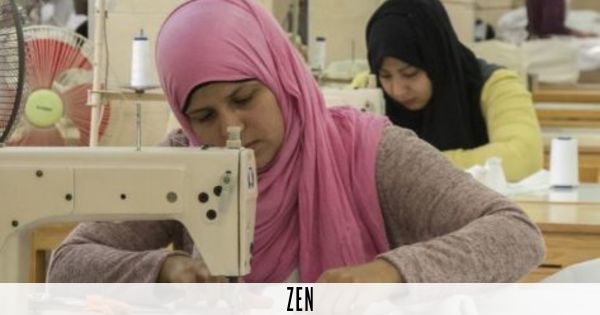At noon, the center of Cairo is a hotbed of horns and souls that litigate to break through. Each in one direction. In one of its colonial buildings, a dozen women zurce outside the chaos that spreads downstairs. Sometimes they laugh; others remain silent, pending each stitch. All of them have turned each encounter into the thread that makes them leave home.
Mariam, a 52-year-old South Sudanese, loves to embroider as much as making friends. His compatriot Rebeca, 20, is challenged to learn to take care of herself. " All these women have a very hard life. It is a tragedy that is related to poverty and lack of opportunities," slips Margarita Andrade, the "mudira" (director) of Malaika, an exclusive textile firm that has three years basting the Best Egyptian cotton with its mission to mitigate the chasms of those who shape their products . "The idea of Malaika was always to make an honest and high quality product but, at the same time, to make the lives of the people who are involved change for the better," he tells EL MUNDO Andrade.
In 2004, two Ecuadorians living in the land of the pharaohs gave birth to a project that employs more than a hundred and a half workers. 75% of the workforce are women who have managed to overcome the barriers to integrate into the labor market. "Here they feel free and protected . They tell us that for the first time they know what it is that someone takes care of them," says the entrepreneur, overwhelmed by emotion. "They can make money to live and they had never experienced that. In the center there are women from Egypt, North and South Sudan, Ethiopia, Eritrea, Somalia, Yemen or Palestine."
ASPIRATE SOMETHING BETTER
The company - which exports about half of its production to Europe, the Arabian Peninsula and Asia - has managed to gain a foothold claiming a return to its origins. "Egyptian cotton is world famous but, when we started, there was not a single local brand. All cotton was being exported to foreign firms," recalls Goya Gallagher, the other half of a project that started in the corner of an office and today it adds milestones between the central workshop and a factory in Six of October, a dormitory city in the arid suburbs of Cairo.
"We opened a workshop in a room in my office, with a sewing machine. We invited some women to learn to embroider. Word spread and they took the whole office," Gallagher says with a laugh. "From the beginning we were clear that we wanted it to be a business and at the same time an opportunity to help women in Egypt ."
Today their workforce is divided between the rooms of their workshops and their own homes. "For some women it is difficult to leave their homes and develop a full-time job because they have children and face the refusal of conservative families. It is much easier to convince them to come two months to train and then earn money from their homes," Gallagher details. "Upon entering the market, we realized that the conditions in the factories were terrible. We did not want to be part of that industry, " he recalls.
In addition to betting on the quality of local cotton, punished for years, and a respectful work environment, the wide range of products that take shape in their barracks - from sheets or towels to cushions or toilets - demands a reunion with the roots. " We want to celebrate the entire Egyptian culture , be it the Pharaonic, the Islamic or the Coptic. Give space to all those different stages of Egypt," Gallagher admits.
The hands that bask the company's future recover the most traditional and laborious embroidery of the country while printing prints with beetles and the Nile represented in tombs and pharaonic temples or trees extracted from the Coptic Christian iconography. Lines that combine the legacy with innovation and contemporary design. "Our next challenge is to recover the Egyptian handicraft that, in some way, is being lost, from glass to ceramics," says Andrade, happy for the story they have finished weaving. "Before, most of the workers in the factories were men. Today we have changed that tradition. We have shown that women can aspire to something better and make their own decisions."
According to the criteria of The Trust Project
Know more- Egypt
- Europe
- Yemen
- Palestine
- Asia
- theater
Wide Angle From Chile to Iraq: the new foci of global discontent
Comic The rarest and bizarre manga: from sex to 'gore'
CompaniesThe industry revolves against energy by the electric bill

